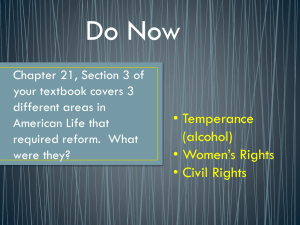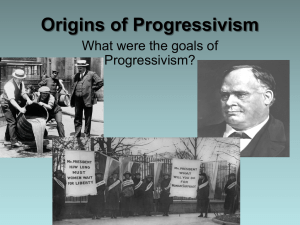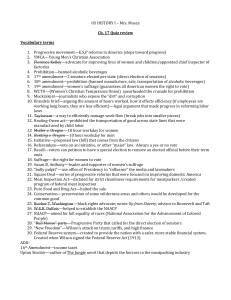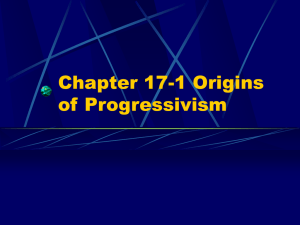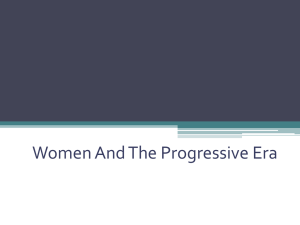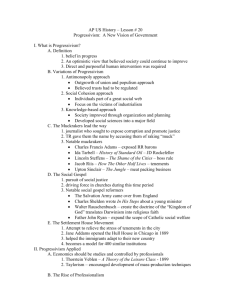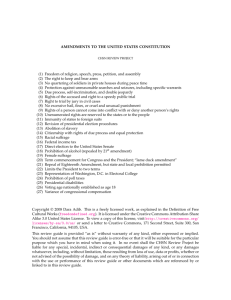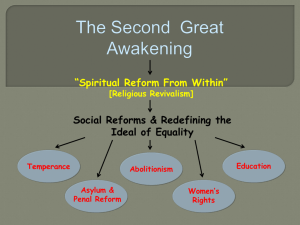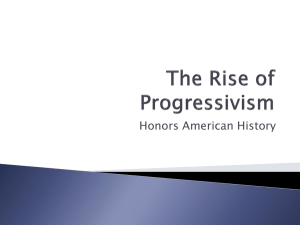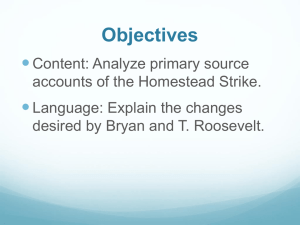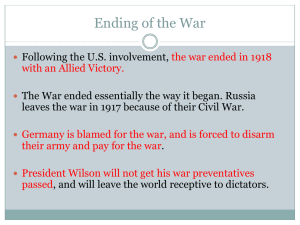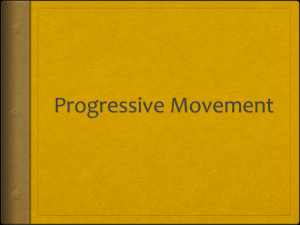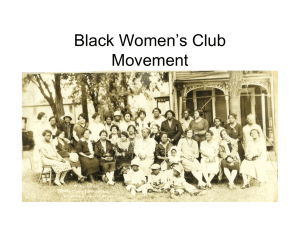Progressive Era
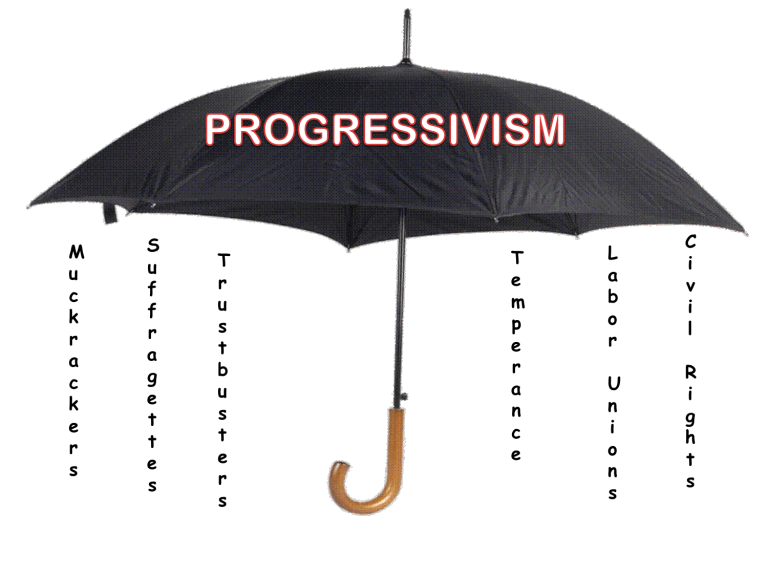
c k r a c k
M u e r s g e r a f f
S u e s t t u s t b u s
T r r s t e a n e r c e
T e m p o i
U n n s b o
L a r g h i
R t s i v i
C l
Life at the Turn of the 20
th
Century
• Technology and innovation helped cities grow
• Skyscrapers, electric transit, urban parks
• Advances in printing, first successful airplane flight,
Kodak camera
• Education = training ground for employment and citizenship
• High schools included more science, social studies, and vocational courses
• Immigrants encouraged to go to school, become
“Americanized”
• Morrill Land Grant Act of 1862: state universities for agriculture research
• Dawn of mass culture
• Leisure activities, sports, department stores, fine arts, jazz music
Segregation and Discrimination
• Southern states had adopted legal policies of racial discrimination
• Voting
• Literacy test, poll tax, grandfather clause
• Jim Crow laws
• Separate facilities for blacks
• Plessy v. Ferguson (1896): “separate but equal” does not violate
Constitution
• African-Americans who didn’t follow racial etiquette could face lynchings
Progressive Era
• Why it matters: Industrialization, urbanization, and immigration brought man benefits to America, but they also produced challenging social problems.
• In response, a movement called Progressivism emerged in the 1890’s. Progressives believed that new ideas and honest, efficient government could bring about social
justice. Progressive ideas brought lasting reforms that still affect society today.
Origins of Progressivism
• Multiple walks of life
– Different political parties, social classes, women, ethnic
groups, religions
– Many were middle class or dissatisfied industrial workers.
– Encouraged the government to enact laws to address the
issues faced by the poor.
– Wanted to use logic and reason to make society
work in a more efficient and orderly way.
Target a variety of problems
1) Women
– Gaining the right to vote = # 1 priority
2) Temperance movement
– Prohibition of alcohol
3) Targeted city officials who built political machines
– Political bosses used bribery and violence to influence voters and win elections.
4) Safe/fair working and living environments
– Crowded living conditions
– Sanitation
– Workers’ rights
– Workplace safety
Temperance: abstinence from alcoholic drink
• Social Gospel movement: 19 th century reform based on the belief that
Christians have responsibility to help poor and improve work conditions
– Rise of groups such as Young Men’s
Christian Association (YMCA), Women’s
Christian Temperance Union (WCTU)
– Many reformers wanted poor people to uplift themselves by improving personal behavior
– Push for Prohibition: banning of alcoholic beverages
• Belief that temperance improves morale
Prohibitionists
• Feared alcohol was undermining American morals
• WCTU led Prohibition movement
• Led to clashes with immigrant groups whose customs included alcohol, as well as urban communities
• Some states began passing
Prohibition laws, 18 th
Amendment (1920) enacted
Prohibition nationwide
Work Hazards
• Each year, about 30,000 workers died on the job due to hazards.
– 500,000 were injured each year
• Triangle Shirtwaist
Factory, NYC
– A factory fire
– Workers had little chance to escape the fire because managers had locked most of the exits.
– 146 died, most of them young Jewish women.
– Many jumped from the windows in desperation.
Improving Work Conditions
• Many immigrants/poorer families sent kids to earn extra wages
– Cheap, could get to hard-to-reach places
– More prone to fatigue, accidents
• Florence Kelley: Lawyer that convinced Illinois to ban child labor, other states soon followed.
• Congress banned child labor officially in
1916.
– Keating-Owens Act: ban goods produced with child labor
– Required children to attend school until a certain age.
• Other workplace improvements
– Ten hour workdays
– Benefits for deaths/injuries
Women’s Suffrage: the right for women to vote
• Many women (20%), especially poorer women, worked for wages
– Farming, garment industry, office jobs, teachers, department stores, maids, laundresses
– Paid less than men, long hours, dangerous conditions
• Why not give women the vote?
– Businesses feared restrictions
– Men feared women’s changing role in society
Three Part Strategy for Suffrage
• Convince state legislatures
– WY, CO, ID, UT, WA in late 1800s
• Pursued court cases
– 14 th Amendment: grant citizenship “to all persons born or naturalized” in the U.S.
– 15 th Amendment: government cannot deny citizens the right to vote
• Constitutional amendment
– Women formed reform groups
• National American Woman Suffrage
Association (NAWSA), National
Women’s Party
• Aggressive tactics like picketing, public speeches, arrests, hunger strikes
• 1919: Nineteenth Amendment passes
Muckrakers
• Socially conscious journalists and other writers dramatized the need for reform
– Sensational investigative reporting uncovered a wide range of problems.
• Teddy Roosevelt nicknamed these journalists muckrakers because they were too fascinated with the ugly side of things.
– A muckraker is a tool used to clean manure and hay out of animal’s stables.
Novelists Defend
• Fiction writers put a human face on social problems.
– They portrayed human misery and developed a new genrenaturalism .
• The Jungle by Upton Sinclair
– Related the despair of immigrants working in Chicago’s stockyards and revealed the unsanitary conditions.
Progressive Politicians
• Theodore Roosevelt- NY
Governor
– Worked to develop a fair system for hiring; made corporations pay taxes .
– Wanted wildlife reform.
– Thought government should assume control if states incapable of dealing with problems
• SQUARE DEAL:
– Control c orporations
– C onservation (wildlife) efforts
– C onsumer protection
• Woodrow Wilson - NJ Governor
– Reduced the railroad’s power and pushed for a direct primary law.
Trust busting
• Some worried about big business
– Trust = legal body created to hold stock, accused of unfair business practices
• Ex: Standard Oil
• Drove competitors out of business, then raised prices
– Middle class wanted the gov’t. to bust the trusts and therefore create more economic opportunities for small businesses.
– Known as the “trust buster”
• Other business improvements
– Federal mediation in industry disputes (ex: coal mine strike)
– Railroad regulation
– Meat Inspection Act (1906): cleanliness regulations
– Pure Food and Drug Act (1906): no contaminated food and drugs
• Inspired by “The Jungle”
• Party leaders traditionally picked candidates for state and local offices.
– Wisconsin established a direct primary, an election in which citizens themselves vote to select nominees for upcoming elections.
– By 1916, all but four states had direct primaries.
Election
Reform
• Initiative people have power to put a proposed new law directly on the ballot by collecting citizen’s signatures
• Referendum allowed citizens to approve or reject laws passed by a legislature.
• Recall voters have power to remove politicians from office
• 17 th Amendment- 1913, direct election of senators by voters , not state legislatures.
